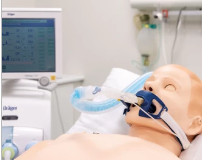
A dermatologist analyzes a medical test. Photo: CET/SES-SC collection.
On 31 March, the Federal Senate approved the use of telemedicine during the COVID-19 pandemic in Brazil. The objective is to alleviate the healthcare system, especially hospitals and health centers, by using technological resources, such as videoconferences, to assist patients. The proposal now goes to the President for approval. The Universidade Federal de Santa Catarina (UFSC) already has a telemedicine tool operating for 15 years, which is currently present in all Santa Catarina municipalities and has proven positive results. It can be an essential tool during this pandemic time.
The proposal of using the UFSC Integrated Telemedicine and Telehealth System (STT) nationally was sent to the Ministry of Health by the Santa Catarina Senator Dario Berger, as a tool to optimize and expand the triage and monitoring of patients diagnosed with COVID-19 across the country.
According to Aldo von Wangenheim, a faculty member of the UFSC Department of Informatics and Statistics, who is one of the creators and the current scientific coordinator of the system, the STT is a compilation of technologies, medical work processes, test protocols and clinical procedures for large-scale remote diagnosis and monitoring of patients in the context of the Brazilian Unified Health System (SUS).
“The STT represents more than 15 years of continuous operation and improvement. Many obstacles placed by ‘real-life’ challenges were already overcome, and we keep offering full and continuous coverage in the state of Santa Catarina”, remarks the professor.
The Integrated Telemedicine and Telehealth System developed by UFSC has been executed uninterruptedly and continuously in partnership with the Santa Catarina State Health Department since May 2005, receiving support of the Pan American Health Organization, the Ministry of Health, the Santa Catarina State Foundation for the Support of Research and Innovation (FAPESC), and the Funding Authority for Studies and Projects (FINEP). The system consolidates basic research technologies and results, adapting and testing them in a large practical real-world environment.
Currently, more than 80,000 medical tests and telemedicine appointments are carried out per month. See below some of the STT numbers:
- More than 650 health institutions connected in Santa Catarina, from health centers to high-complexity hospitals;
- More than 100 health institutions connected in the states of Bahia, Mato Grosso do Sul, Mato Grosso and Tocantins, for which STT offers a few services;
- More than 55,000 healthcare workers using the system, of which 35,000 live in Santa Catarina;
- All the 295 Santa Catarina municipalities assisted;
- More than 80,000 tests carried out per month, totaling 9,5 million tests since 2005.
Telemedicine in the Unified Health System (SUS)
Professor Aldo von Wangenheim explains that the technology and many of the processes and protocols used in the system were developed from scratch, since large-scale telemedicine in the public health sector is a technological area still unexplored internationally. UFSC has been conducting research in this area since 1999. In the STT, it is possible to store and send imaging tests of various types, manage communication between healthcare workers, and accommodate a network with a central cloud storage.
“Since the beginning, the STT was designed to assist the public health system; it is developed using free software and does not require licenses or great operational costs”, highlights the professor.
“At the moment, we have the system installed in the University Hospital at UFSC (HU/UFSC), where we are developing an integration with the University Hospital Management App (AGHU), which operates there. In addition, we have experience regarding the integration of our system into electronic record systems: currently, the system is integrated into the MICROMED electronic record systems used in all public hospitals in Santa Catarina, through a standardized and transparent integration via DICOM Worklist, as well as into the legacy record systems of the HU/UFSC. An integration with e-SUS was also designed and it is in its planning stage”, informs the researcher.
Further information
UFSC Telemedicine/Telehealth website
Tools integrated into STT
Explanatory videos about STT
With information from Agência Senado, UFSC Telemedicine/Telehealth | Translated by SINTER
Read the original article here.






 The first prototype is almost finished due to the efforts of students, faculty, technical administrative staff, physicians and many other professionals. “This project integrates the expertise of many researchers, applying Engineering knowledge with efficiency and simplicity to meet an urgent need for complex equipment”, explains Professor Henrique Simas, a faculty member of the Department of Mechanical Engineering (
The first prototype is almost finished due to the efforts of students, faculty, technical administrative staff, physicians and many other professionals. “This project integrates the expertise of many researchers, applying Engineering knowledge with efficiency and simplicity to meet an urgent need for complex equipment”, explains Professor Henrique Simas, a faculty member of the Department of Mechanical Engineering (